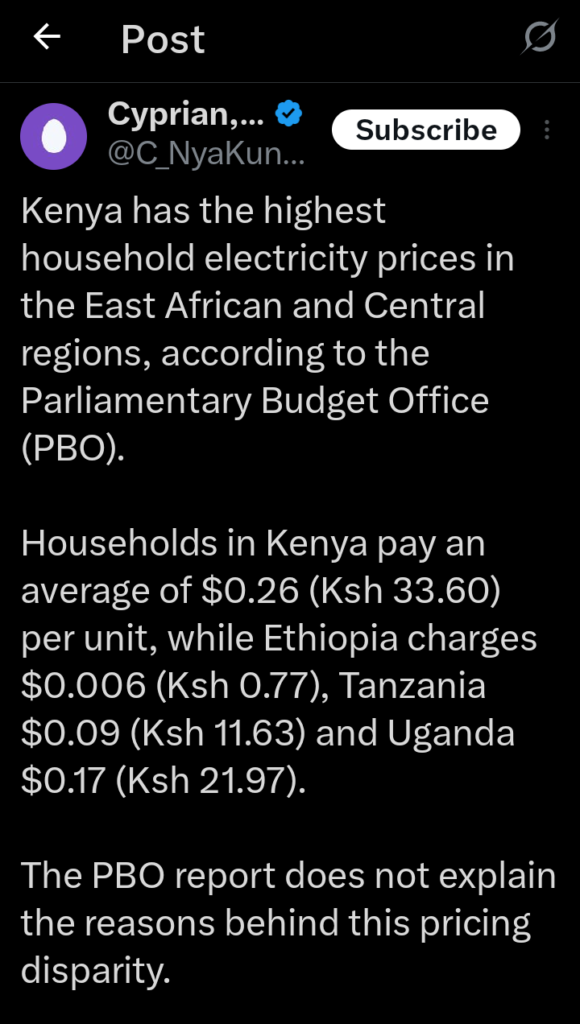According to a report shared by Cyprian Is Nyakundi on X, Kenya has the highest household electricity prices in East and Central Africa, according to the Parliamentary Budget Office (PBO).
Households in Kenya pay an average of $0.26 (Ksh 33.60) per unit, a rate significantly higher than neighboring countries. Ethiopia charges $0.006 (Ksh 0.77), Tanzania $0.09 (Ksh 11.63), and Uganda $0.17 (Ksh 21.97).
This pricing disparity raises questions about why Kenyans continue to bear such high costs while their neighbors enjoy cheaper power. The PBO report does not provide clear reasons for this difference, but there are factors that make Kenya’s electricity so expensive.

One of the main reasons for Kenya’s high electricity costs is the structure of power purchase agreements (PPAs) signed between Kenya Power and electricity generators.
These agreements lock in high rates for power, ensuring that independent power producers (IPPs) get paid even when their electricity is not fully used.
Many of these contracts are structured in a way that benefits private companies at the expense of consumers.
Some power producers charge much higher prices per unit compared to what is available from Kenya’s state-owned generators, yet Kenya Power is legally bound to buy from them.
This forces the company to pass these high costs on to consumers, making electricity more expensive for ordinary Kenyans.
Extra taxes and fees also contribute to high electricity prices. When a consumer gets an electricity bill, the actual cost of power is only part of what they pay for. There are additional charges, including fuel cost adjustments, forex adjustments, and taxes such as VAT.

These extra costs make electricity bills unpredictable and often unaffordable for many Kenyans. The forex adjustment charge, for example, is linked to the exchange rate, meaning that whenever the Kenyan shilling weakens against the US dollar, electricity costs rise.
Since Kenya imports fuel for thermal power generation, fluctuations in global fuel prices also have a direct impact on electricity prices.
Government inefficiencies and mismanagement further complicate the problem. Corruption within the energy sector has been exposed multiple times, with reports of inflated contracts and procurement scandals at Kenya Power and other state agencies.
Funds meant to improve electricity infrastructure are often misused, leading to losses that are eventually transferred to consumers.
Efforts to reform Kenya Power and renegotiate expensive power contracts have been slow, leaving households and businesses struggling with high costs.
The high electricity prices have serious consequences for the economy. Many businesses face difficulties due to the high cost of operations, which affects profitability and job creation.
Small businesses, which form the backbone of Kenya’s economy, struggle to keep up with power bills, forcing some to shut down. For ordinary households, the high cost of electricity limits access to basic needs like lighting, refrigeration, and cooking.

Many Kenyans are forced to use alternatives such as charcoal and firewood, which are harmful to the environment.The government has promised reforms in the energy sector, but little has changed.
Until there is a serious review of power purchase agreements and a reduction in unnecessary taxes and fees, Kenyans will continue to pay more for electricity than their neighbors. The impact of these high costs is felt in all sectors of the economy, and without urgent action, the situation will only worsen.





















Add Comment